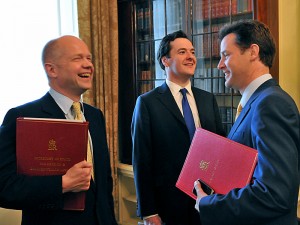 The whole world watched India undertake the largest election in the history of mankind, and we have not stopped watching. Prime Minister Narendra Modi’s historic victory and his bold plans for India’s future have grabbed the world’s attention.
The whole world watched India undertake the largest election in the history of mankind, and we have not stopped watching. Prime Minister Narendra Modi’s historic victory and his bold plans for India’s future have grabbed the world’s attention.
The Indian people have given their government a mandate for change and for reform that could be transformational and the United Kingdom stands ready to partner with India to realize your prime minister’s vision of growth and development, benefitting all Indians and releasing more of this nation’s immense potential. That is why, as the British foreign secretary and chancellor of the exchequer, we are here in India this week as a team to build on the partnership between our two countries.
We already have a deep and important relationship, but it could be even stronger. That is why our government has made a determined effort to strengthen the foundations of our partnership over the past four years. It is why we have made more than 50 ministerial visits to India, why we have strengthened our diplomatic network and why we put new energy into increasing trade and investment.
This effort is bearing fruit for both countries: our bilateral trade is now almost 50% higher than it was in 2009; UK companies are the biggest investors in India; and, over the last few years Indians have invested more in the UK than European Union countries put together.
We are visiting India this week because we want to work with Prime Minister Modi’s government to build on those ties, to back his plan for economic development and to strengthen our partnership on the world stage. As India pursues a wide-ranging programme of change, we believe Britain has something to offer across the board.
First, our bilateral trade and investment has huge potential for further growth. British companies still sell less to India than they do to Switzerland, a country 150th the size. This has to change, and there is a new drive for trade in the British economy: we are growing faster than almost any other western country, we are massively increasing support for exporters and we have made our business environment even more competitive.
We want to see more Indian companies coming to Britain, following in the footsteps of the likes of Tata. We want to help India access international markets for investing in infrastructure.
We want British firms who built the infrastructure for the London Olympics to help build the 100 new cities Prime Minister Modi is planning, our world-leading transport companies to help develop your new roads, railways and ports, and our defence and aerospace companies to help bring India more cutting-edge technology, skills and jobs.
Second, we believe we should strengthen our educational ties because we both benefit from the flow of ideas and expertise, and from the understanding and contacts our students and researchers develop.
The UK has welcomed almost 1,00,000 Indian students to our world-class educational institutions in the last five years and thousands of researchers and academics. We are clear: there is no limit to the number of qualified Indian students who can study at British universities and no limit to the number that can work in graduate employment.
We have now allocated £50m through our Newton Fund for joint research with India to tackle some of the world’s biggest challenges, from sustainable water supply to renewable energy to public health; and we will continue to look for opportunities to build up our educational links.
Third, we want to strengthen our cooperation in development and in foreign policy. Together we can do more to advance our shared interests, from tackling terrorism to addressing climate change to building regional stability.
India wants a secure environment abroad in which to pursue development at home and the UK through our diplomatic and defence capabilities and our membership of the UN Security Council, Nato and EU, can help find solutions that work for us both to problems that affect us both.
We are deeply concerned over the kidnapping of Indian citizens in Iraq and we want to work more closely together to address the many challenges of an unpredictable and unstable world. To help us do this, we want an expanded UNSC with a permanent seat for India.
The UK has had a steady purpose over the past four years: to strengthen ties with India for the long term. This week we will be pursuing that goal in our meetings with business leaders, civil society, with Prime Minister Modi and with external affairs minister Sushma Swaraj and finance minister Arun Jaitley.
We want to build on the advances we have already made, to support your new government’s clear and ambitious plans for the future, and to give a new impetus to this special relationship that can be one of the great partnerships of the 21st century.